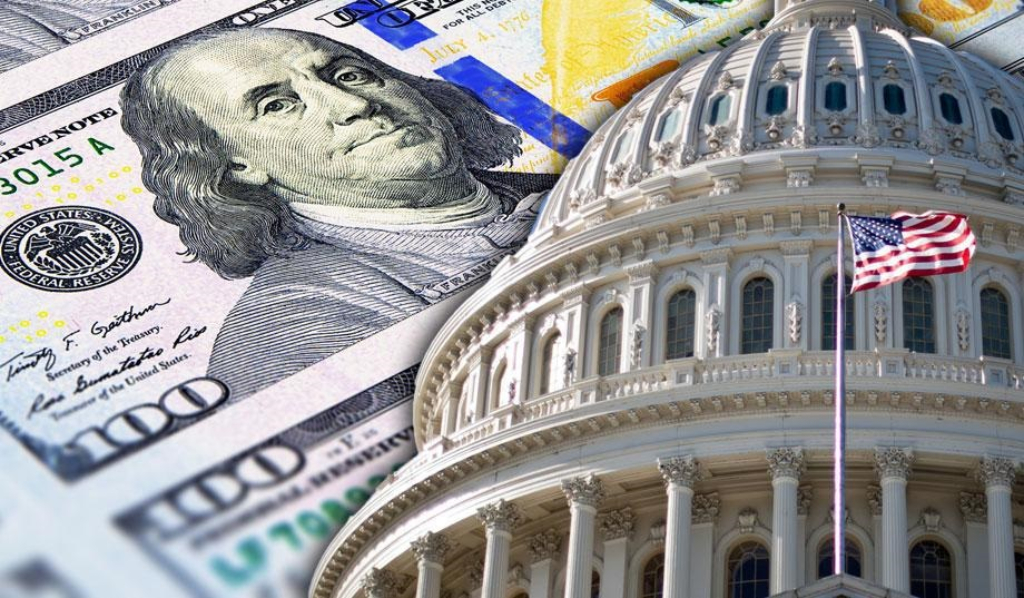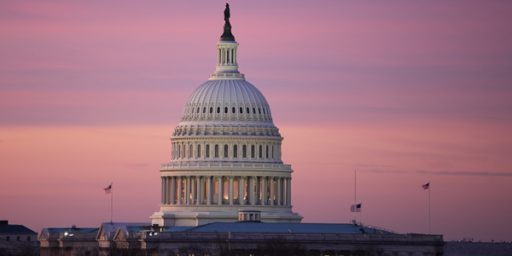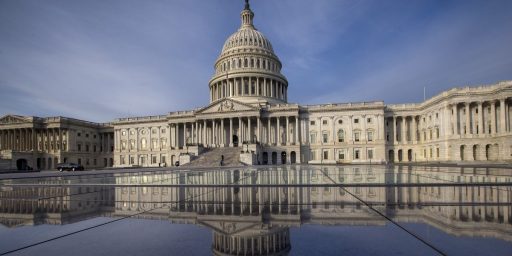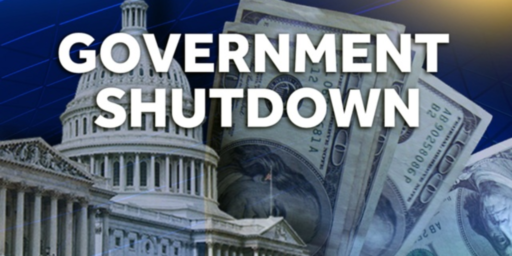Congress Painting Trump Into A Corner On Budget
In the past, President Trump has threatened to shut down the government if the doesn't get what he wants in the budget. The latest budget deal effectively dares him to do it.

In a move that effectively dares President Trump to exercise a veto and shut down the Government, Congressional negotiators have reached an agreement on a budget deal that would keep the government operating through December 7th:
GOP leaders believe they’ve found a way to thwart President Donald Trump’s latest shutdown threats: Send him a funding bill that’s impossible to resist.
Capitol Hill leaders on Thursday announced a mammoth fiscal 2019 spending deal that achieves one of the Trump administration’s top priorities — the Pentagon’s first on-time spending bill since 2008. But there’s a catch.
The same package also funds some of the government’s most sprawling agencies at levels that are billions of dollars more than Trump requested. And if Trump refuses to sign it, much of the government, including parts of the Pentagon, would shutter.
“You effectively shut down the whole government,” Rep. Tom Cole (R-Okla.), a senior appropriator, said of the funding deal he helped shape.
Spending leaders from both parties detailed the strategy for the first time Thursday, just 17 days before government spending runs out. The Senate is expected to easily approve the package next week.
Under the tactic, lawmakers will vote on a two-bill spending package that funds the Pentagon as well as health, labor and education programs. There’s also a new third component: Spending leaders said that the package will include temporary funding for every other agency facing a funding lapse on Sept. 30.
If approved, the bill would keep those government operations open until Dec. 7, about a month past the looming midterm elections.
Longtime appropriators of both parties said that strategy effectively ties the administration’s hands — forcing Trump to decide between signing a spending bill with domestic funding levels he detests, or forcing a potential funding crisis at the Pentagon.
“The president will have to sign this bill or shut down the government, because it contains the continuing resolution,” said Rep. Rosa DeLauro (D-Conn.), one of the top Democratic negotiators on the package.
Trump himself has cheered Congress’ progress on the Pentagon spending bill, which would break the military’s nearly decadelong stop-and-go funding cycle. On domestic funding, however, Trump’s deputies have chided Congress for overspending.
It’s not just Trump with complaints about the massive domestic bill. House conservatives, too, are livid about funding increases, as well as a lack of conservative policy wins at a time when the GOP controls all levels of government.
“Most of the Democrats will vote for this and smile very big,” Rep. Mark Meadows, chairman of the House Freedom Caucus, told reporters Thursday. “It’s a Democrat ‘Labor-HHS’ bill.”
The Republican Study Committee, an influential group of about 170 GOP lawmakers, also released a statement Thursday that suggested its members would be willing to oppose the upcoming package — even if it means voting against the Pentagon cash.
House GOP leaders aren’t worried about the Republican whip count, according to lawmakers and aides, in part because of the politically toxic prospect of voting against the military’s budget just weeks ahead of election day.
“If they want to vote against Defense, that’s up to them,” said Cole, the lead negotiator on the domestic package. He quoted his Democratic colleague, Sen. Patty Murray (D-Wash.) about how both parties’ negotiators decided to work together: “We can have a deal, or we can have a fight, but we can’t have both.”
Precise details on funding and language remain under wraps until the final text is rolled out. But negotiators said that the final package would largely strip out partisan language favored by House Republicans.
That means lawmakers rejected attempts to defund Planned Parenthood or destabilize Obamacare, as well as a slew of other perennial conservative riders.
More from CNN:
House and Senate negotiators reached bipartisan agreement on a package of spending bills, as well as a continuing resolution to fund the remainder of the government through December 7 and forestall a potential government shutdown battle, aides in both chambers told CNN on Thursday.
The agreement, which the Senate is expected to adopt next week and the House the week after, will prevent a shutdown if President Donald Trump chooses to sign the bills. House and Senate aides say they have been told by White House officials he will sign, avoiding a shutdown in the weeks before the election.
By law, Congress must pass a series of 12 appropriations bills to fund the government before October 1 of each year. That deadline is frequently missed, resulting in shorter-team spending bills, known as continuing resolutions or CRs, over time to avoid government shutdowns until Congress gets it all done.
For 2017, lawmakers passed multiple continuing resolutions until they finally produced a massive spending bill — known as an omnibus — in March that packages all of the required spending bills together. Trump, frustrated at the process and $1.3 trillion price tag of the omnibus, vowed to “never sign another bill like this again.”
And both chambers are moving more quickly than they have in the recent past to pass those bills on time, though leaders announced Thursday they will still need the CR to fund part of the government through the first week of December.
Congress passed its first package of spending bills this week, with the Senate approving the final version Wednesday night and the House passing it Thursday. The package is a so-called minibus, meaning it puts together three different spending bills (of the 12) that cover a sizable chunk of government, including military construction, the Veterans Affairs department, energy and water development and the legislative branch.
The House and Senate are currently conferencing on two other minibuses, which, combined, represent six of the 12 spending bills that need to pass before October 1.
They are expected to pass the second minibus — which covers the departments of Defense, Labor and Health and Human Services — before October.
Negotiators will try to finish the third minibus and other spending bills before the December CR deadline.
One of the agencies that will get renewed through the CR is the Department of Homeland Security. Trump has been adamant about getting more funding for his signature campaign promise of a border wall, which comes through the Department of Homeland Security. By extending the funds with the CR, a fight over the border wall essentially gets pushed until after the midterms in November — a key goal for GOP leaders.
This is something of a rebuke to the President for two reasons.
First of all, Trump has said on several occasions that he would no longer agree to the kind of temporary spending bills that have become commonplace on Capitol Hill, even if means shutting down the government. In reality, of course, the President has ended up signing off on spending bills like this on several occasions notwithstanding this promise on his part so it’s likely that he would sign off on this one in any case. In order to make sure that’s the case, though, Congressional negotiators are proposing to tie the Continuing Resolution to the bill that would fully fund the Defense Department for the entire Fiscal Year, a popular bill that the President would not be likely to veto. So, in this respect, they have given the President the choice of either signing the Continuing Resolution or denying funding to the Defense Department for the entire year. It’s unlikely that the President would go for the veto in these circumstances.
Second, the President has also promised that he would shut the government down if Congress fails to include funding for his border wall in the upcoming budget. As noted above, though, the current spending plan does not include any funding for the wall and instead kicks that issue until after the midterms. This is pretty much how Congress has treated the border wall issue from the start. While they tend to humor the President’s insistence on funding for the wall, a request he has made repeatedly despite his original claim that Mexico would be the one to pay for the wall, Congress has so far resisted any effort to spend anything other than a small amount of money on the project, and certainly has not committed to fully funding it. Once again, though, the way the budget deal is structured would leave the President with the dilemma of whether he wants to hold the budget hostage to get funding or his border wall funding, or whether he wants to give in yet again. Most likely, he’ll give in.





Butbutbut trump makes the best deals!
Well, at least they’re saving money on the rope needed to tie Trump’s tiny little hands.
@TM01:
Yes, right before a congressional election, shut the government down and make sure everyone knows it’s all the Republican controlled Congress’s fault.
Please don’t throw me into that briar patch, Brer Trump!
@TM01:
Huh…
Not only is Congress controlled by the party the Trump is the head of, but I’ll point out that past Trump laid deficit spending right at the feet of the president:
I so look forward to hearing your excuses when Trump signs off on the budget.
Man, it’s amazing how you folks continue to be the victims.
Oh fuck off, you disingenuous fluffer…if Trump was so worried about the deficit, he wouldn’t have so readily agreed to and signed into law the massive, irresponsible tax cuts, which mostly benefit people like him…cry me a river for all of his supposed “concern”…
@TM01:
What stunning deficit-reduction measures did Trump propose on the campaign trail? Promising Mexico would pay billions of dollars for a wall on the Southern border? Claiming that unlike his Republican rivals he wouldn’t touch Medicare and Social Security? Saying his health-care plan would have the government take care of everyone? His massive tax cuts for the wealthy?
Trump didn’t win by offering serious proposals for bringing down the deficit. He won by promising everyone free ponies then claiming it would all magically cause the deficit to disappear.
“Let’s all talk about how HORRIBLE the deficit is and how it’s all Trump’s fault…. Then pass another monster budget and try and force Trump to sign it. Then blame Trump for it.”
Trump is the party leader. He is supposedly a gifted deal maker. Trump really is responsible as the chief executive AND the party leader for this budget. If he doesn’t have the leadership skills to accomplish his party’s goals, they you guys elected the wrong person. Idiots like you really seemed to think he would change things. It’s really sad. It was pretty obvious that he is no different than other GOP leaders. Tax cuts that would mostly benefit the wealthy, then run a deficit financed economy so you can claim that the economy is booming.
Steve